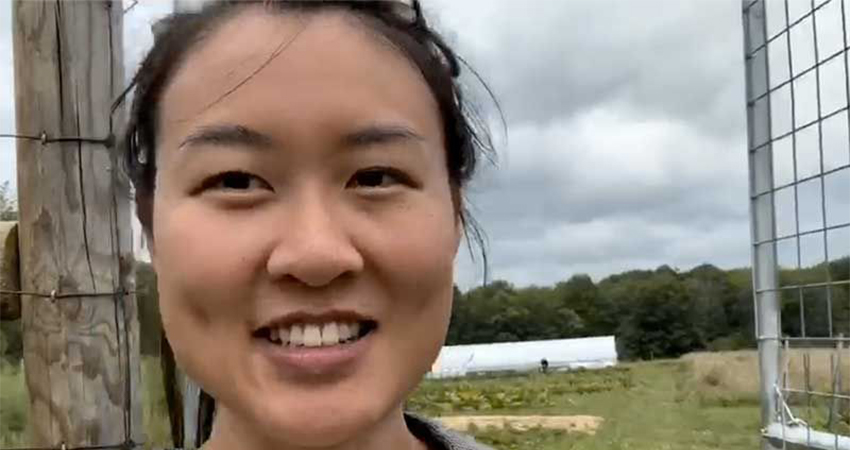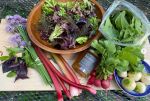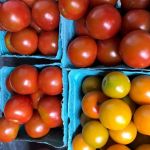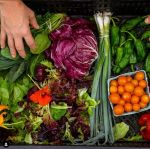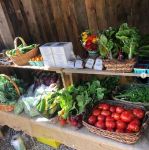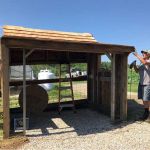For many years, Noble Horizons has drawn inspiration from the local farm-to-table movement. In the early years, we hosted free community cooking classes with farm-to-table chefs and offered local farm produce for sale. We also established our own gardens in which residents and staff grow herbs and vegetables which they harvest for use in meals they prepare together.Today and every Friday, we will introduce you to local farms and farmers as well as community members who grow fresh, delicious food to nourish our bodies and our communities. We hope you enjoy meeting them and will support local farms and farmer markets by selecting products from their bounty for your table.
Husky Meadows Farm is two acres of farming land that offers up prolific certified organic produce. It’s supported by good soil and a purpose-driven team, headed by farm manager Tracy Hayhurst. Owned by David Low, Dominque Lahaussois, and Pierre-Alexander Low, the farm is carved out of the family’s 300-acre property in Norfolk.
Hayhurst is an experienced farmer and professional chef. Her resume includes an apprenticeship with the Western Mass Collaborative Alliance for Farmer Training (CRAFT) where she developed her foundational understanding of seasonal food, crop diversity, and healthy soil. Then it was off to Cork, Ireland to attend Ballymaloe Cookery School. In 2002, she co-founded Chubby Bunny Farm, a CSA that ran for 12 years. Hayhurst then became the Director of Community Outreach and Chef at a farm and community non-profit called Plantin’ Seeds before finding her home at Husky Meadows.
These two sides to Hayhurst–farmer and chef–seamlessly entwine their way through her views about food. “For me, it’s not a split personality between farming and cooking. I can’t have one without the other. What’s in the garden informs what I want to cook and what I want to cook informs the garden. I love what I do. I love food. Farming is so dynamic with its seasonality. It never gets old.”
A large part of Husky Meadow’s operation is the CSA farm share which this growing season is sold out. For her, the most direct benefit of the CSA is that, “Food is freshest, healthiest, and tastiest the closer it is to where it was grown. It hasn’t been shipped over distances. It’s like having your own garden without the work.”
Each week, farmer Hayhurst and her team divvy up that week’s bounty amongst the members. Chef Hayhurst writes an accompanying blog that’s not too bloggy. Hayhurst clarifies, “It’s not exactly a blog–more like tips of the week for preparing and enjoying what’s on offer. It’s about education. Many people are not used to eating seasonally and aren’t exposed to the diversity of what can be grown. I try to demystify and give suggestions for how they can enjoy their week’s share.”
For Hayhurst, the CSA is not transactional, it’s relational. She explains, “It’s a relationship built on trust. I need to create an understanding with shareholders that I’m going to give them the highest quality, most interesting, and diverse food in a quantity that’s sufficient but doesn’t encourage waste. I want to instill curiosity and adventurousness toward seasonal food.”
Along with CSA’s and the newly-launched farmstand at Husky Meadows, the farm also offers prepared foods executed by Steve Archaski, head baker and prepared foods chef. Using what’s on offer over the course of the growing season he does what he does best–incorporates the ingredients into tasty pre-prepared offerings.
When the Husky Meadows’ team is not farming, they’re planning for the opening of Seed and Spoon, a culinary retreat experience set to launch in the spring of 2021. While staying on the farm for the weekend, attendees with work with Hayhurst to get an inside view of an organic farm and then move to the kitchen to prepare what’s on offer at that moment in the growing season before gathering for a communal meal prepared from the bounty.
The emphasis on seasonality is foundational to Hayhurst’s approach for Husky Meadows and her desire to educate the surrounding community about the importance of local farms and organic farming in particular. “Organic farming goes beyond not using chemicals. For me, organic is about being in a whole ecosystem. We’re trying to take care of the soil because it is the most elemental foundation of a healthy farm. This also leads to better tasting and more nutritious food for us.”

